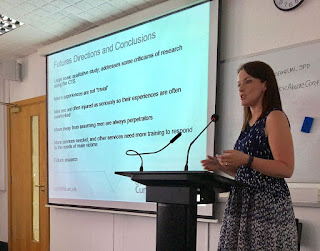Ethics Guidelines for Internet-Mediated Research and Bristol Online Survey
 |
| Elaine Watson |
The University of Cumbria (UoC) endorses the use of an
online survey tool called Bristol Online Survey (BOS), which is produced and
run by Bristol University. In BOS you
can create, distribute and analyse survey data. It is a fantastic tool for students
and academics alike, a few years ago we introduced an induction process for all
students wishing to use BOS to ensure all surveys met ethical requirements. For example, all surveys must include
participant information, consent question, debrief information and contact
information. These all may sound obvious
to any researcher, however in the relaxed and distanced world of the internet
and internet based research these things can quite easily be overlooked. The British Psychological Society (BPS) have
recently issued new Ethics Guidelines for Internet-mediated Research. As a team
we needed to discuss the impact of these new guidelines on our use of internet
research.
The new BPS guidelines were an interesting read, yes
quite! They cemented the knowledge that
we need to include the staple ethical requirements of any data collecting
method in online surveys. Participants are participants and they need informing
and protecting throughout the process, whether this is a face to face interview
or thousands of miles removed on a link through a social media outlet. It also made us think about the further
complexity of internet surveys, data storage, and security. The survey may be anonymous but the server might
store an IP address alongside an online survey response which can be linked to
an identifiable individual.
In terms of consent and withdrawal on an internet based
survey, can you just close the browser at any point should you wish to
withdraw? Do you know if the responses
up to that point have been stored and could still be used? The new guidelines
make the following suggestions:
- To have a consent question at the start and end of your survey
- To have a withdrawal option at the bottom of each page
- In the consent question/participant information, include the minimum age participants must be to take part in the survey
What happens should the participant wish to withdraw after
they have completed the survey? A
further suggestion would be to ask a question in your survey (ideally on the
consent page), which asks them to input a memorable word or number. Should they
wish to withdraw from the study at a later date, their data can be identified
by them only and then removed.
These are all matters which will now be added into our
standard induction for all students who wish to use BOS as a data collecting
tool. There are still a couple of
outstanding questions to look into though. One is the survey tool, and whether
there are the security mechanisms to ensure anonymity. I know it is fully compliant with all UK data
protection laws but can you trace an IP address back to the survey? The final matter for me to look into is, what
happens if a participant withdraws half way through a survey, are those answers
stored and used in analysis? For now, a
little more research and scrutinising is to be done. All said, BOS is a
fantastic tool for collecting data, and I really enjoy using it and teaching
our students how to use it too!
Elaine Watson is one of our Psychology Technicians, if you
would like to contact her please email her on: Elaine.Watson@cumbria.ac.uk


Comments
Post a Comment